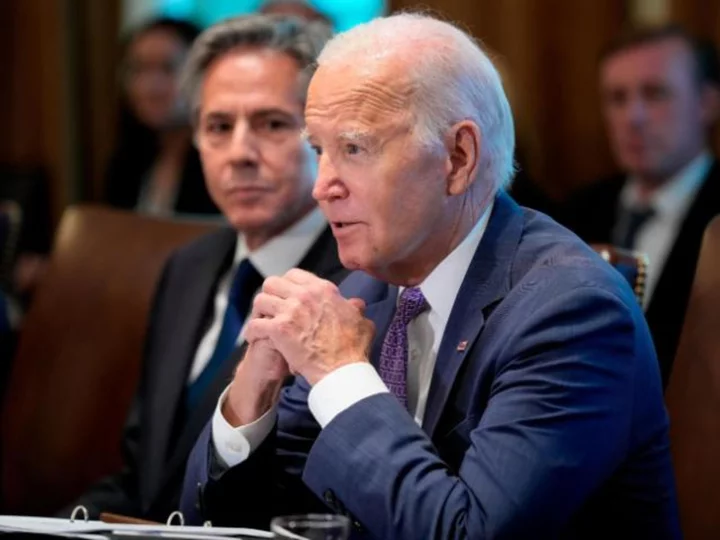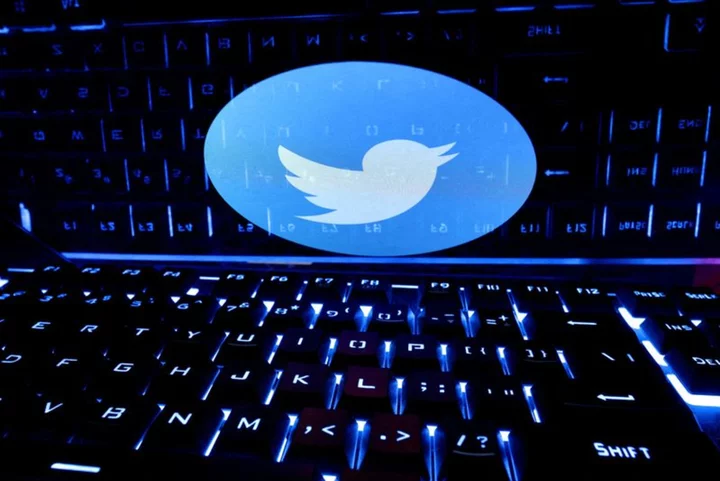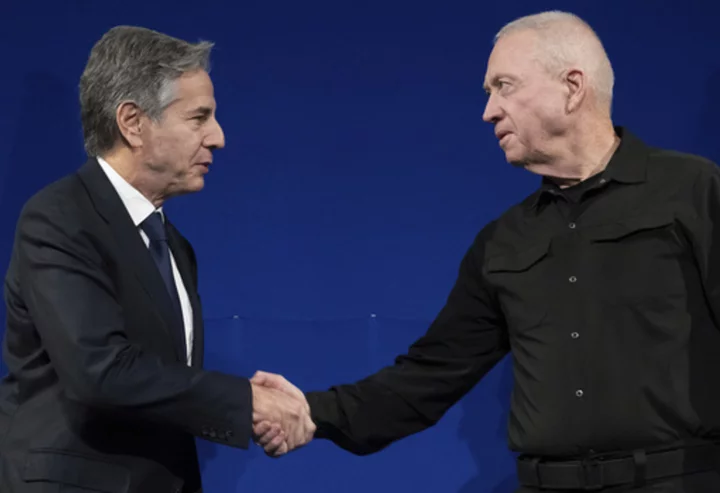The deadly surprise offensive by Hamas militants on Israel over the weekend threatens to ignite tensions between moderate and progressive Democrats already divided over the Jewish state's treatment of Palestinians in Gaza and the occupied West Bank.
For President Joe Biden, that long-simmering discord is at risk of mushrooming into a divisive intraparty clash over the US government's next moves -- especially as Israel launches what it has promised will be a ferocious crackdown on Gaza -- that could ultimately threaten the liberal coalition so crucial to his reelection strategy.
Early signs of Democratic infighting and anxieties over potentially difficult choices to come have been cast into sharper relief by the near unanimity among high-profile Republicans on Israel. From powerful figures in Washington to the GOP presidential primary field, they have almost unanimously pledged unquestioning solidarity with the Israeli government while blaming Biden, who recently agreed a limited deal with Tehran to free hostages in exchange for unfreezing billions in Iranian assets, for not taking a harder line in the region.
Though hardly new or novel, angry rumblings from inside the Democratic tent began almost immediately in aftermath of the first round of attacks by Hamas over the weekend. Staunchly pro-Israel moderates, led by Biden, responded with firm resolutions of support for Israel and condemnations of what many described as an "unprovoked" assault by Hamas.
Progressives, though, sought a more nuanced description of the escalating conflict, mixing expressions of grief over the deadly violence with attempts to highlight the devastating -- and radicalizing -- effects of Israel's blockade of Gaza. That policy denies Gaza residents critical supplies and freedom of movement and, paired with a surge of Jewish Israeli settlers taking over land in the occupied West Bank, helped fuel the momentum, as some progressives have characterized it, for such a widespread and brutal reprisal from Palestinian militant groups.
In a statement Saturday morning, as the breadth of the attack became clear, Biden "unequivocally" condemned "this appalling assault against Israel by Hamas terrorists from Gaza" and reported telling Israeli Prime Minister Benjamin Netanyahu "that we stand ready to offer all appropriate means of support to the Government and people of Israel."
"Terrorism is never justified," Biden added. "Israel has a right to defend itself and its people."
National Security Council spokesperson Adrienne Watson echoed that message, but also described the attacks as "unprovoked" -- a term that many fellow Democrats, from Congress to city halls, used in their own statements.
Leaders of left-wing American Jewish group IfNotNow said in a statement that it condemned the killing of innocent civilians and that its members were watching "the unfolding horrors with heartbreak and dread for our loved ones -- Israelis and Palestinians alike." But in a sharp rejoinder to Democratic talking points, the group insisted, "We cannot and will not say today's actions by Palestinian militants are unprovoked."
"The strangling siege on Gaza is a provocation," they wrote. "Blood is on the hands of the Israeli government, the US government which funds and excuses their recklessness, and every international leader who continues to turn a blind eye to decades of Palestinian oppression, endangering both Palestinians and Israelis."
The liberal group J Street sought a more conciliatory tone, saying it stood "with the Israeli armed forces working furiously to repel this assault," but also called for restraint, urging "the US government to do everything possible to assist the State of Israel in confronting this threat, defending its citizens, and preventing a slide into even further conflagration and suffering for Israelis and Palestinians."
J Street spokesman Logan Bayroff argued that the political threat to Democrats in the US was overstated and that domestic politics are "at the bottom of the list" of concerns for the party right now.
"This conflict's not getting better. It's getting worse, it's getting a lot worse. That's not a happy success story that anybody wants to tout on the campaign trail," Bayroff said. "But it's a painful reality that I think Democrats at least are going to be willing to confront. I don't think Republicans are going to be willing to confront it. Republicans are going to have the same failed, extremist talking points that we saw from the war on terror in our own country."
But Democrats took years to effectively counter GOP messaging about the invasions of Afghanistan and Iraq. The fundamentally implacable nature of the Israeli-Palestinian conflict, too, has already led some top Democrats to flub their lines.
"I have been in touch with communities impacted by what's happening in the region. It is abhorrent. My heart is with all those impacted. We need peace in this region," Michigan Gov. Gretchen Whitmer, a national Democratic star and usually estimable communicator, wrote on social media early Saturday evening. After being shellacked by right-wing media and some Democrats over her ambiguous message, she followed up hours later with a more robust one, saying in part, "The loss of lives in Israel -- children and families -- is absolutely heartbreaking and appalling.
"There is no justification for violence against Israel," Whitmer added. "My support is steadfast."
The split among Democrats and the broader political left, groups that largely came together during the Trump presidency, has become more pronounced over the past few years, reaching what many on the progressive left have described as a point-of-no-return when Netanyahu accepted an invite from Republicans to address a joint session of Congress in 2015 as he sought to derail then-President Barack Obama's nuclear deal negotiations with Iran.
Netanyahu's attempts to sway the Obama administration by firing up popular disapproval failed, and though Trump withdrew from the agreement years later, Netanyahu -- along with his right-wing governing partners -- has sought to profit politically from Democratic discord over the US' strategic support for Israel.
Pro-Israel groups such as the Democratic Majority for Israel, a super PAC, and AIPAC, a bipartisan but increasingly conservative organization, have spent heavily to beat back progressives running against moderate candidates in Democratic primaries.
Michigan Rep. Rashida Tlaib, the first Palestinian-American woman to serve in Congress and a frequent target of those groups, divided opinion among Democrats with her initial reaction, in which she expressed grief over the deadly violence and pledged to pursue a "just future."
"The path to that future," Tlaib said, "must include lifting the blockade, ending the occupation, and dismantling the apartheid system that creates the suffocating, dehumanizing conditions that can lead to resistance."
Her comments were met with immediate backlash from conservatives and some moderate Democrats. But the most heated domestic flashpoint so far has been a pro-Palestinian rally held on Sunday in New York City's Times Square. Though not organized by the Democratic Socialists of America, it was endorsed by the citywide chapter of the group.
Democratic Israel hawks in New York, led by Gov. Kathy Hochul and Rep. Ritchie Torres, excoriated the group for touting the rally.
"The planned rally is abhorrent and morally repugnant," Hochul said on social media.
Torres, no stranger to rhetorical clashes with DSA, claimed that the group was "glorifying the terrorism of Hamas as 'resistance,'" and called it "an antisemitic stain on the soul of America's largest city."
Republicans piled on, too. Rep. Mike Lawler, a freshman Republican from a typically blue district north of the city, called out Democratic Rep. Alexandria Ocasio-Cortez, who is usually aligned with DSA, before the planned rally.
"Do you agree with these lunatics?" Lawler asked in a post on X, formerly known as Twitter. "Yesterday's terrorist attack perpetrated by Hamas and sponsored by Iran is the fault of Israel? You should denounce this if you don't agree with it."
On Monday, Ocasio-Cortez's office issued a statement calling the bloodshed "devastating for all those seeking a lasting peace and respect for human rights in Israel and Palestine."
"No child and family should ever endure this kind of violence and fear, and this violence will not solve the ongoing oppression and occupation in the region," she said, calling for an "immediate ceasefire and de-escalation" in the region.
Some mostly online leftists rushed to condemn her statement for not going far enough in support of the Palestinian cause. She wasn't alone. Vermont Sen. Bernie Sanders, the two-time progressive presidential primary candidate and the most powerful leftist in government, was also criticized by political allies for, as some put it, not sufficiently backing the Palestinians.
"I absolutely condemn the horrifying attack on Israel by Hamas and Islamic Jihad. There is no justification for this violence, and innocent people on both sides will suffer hugely because of it," Sanders said. "It must end now."
The backlash, though limited for now, offers a clear warning that this latest crack-up in the Middle East endangers not only Democratic unity in the US but could -- in a mirror of the geopolitical challenges -- trigger new or latent factional disputes across the American political spectrum.









